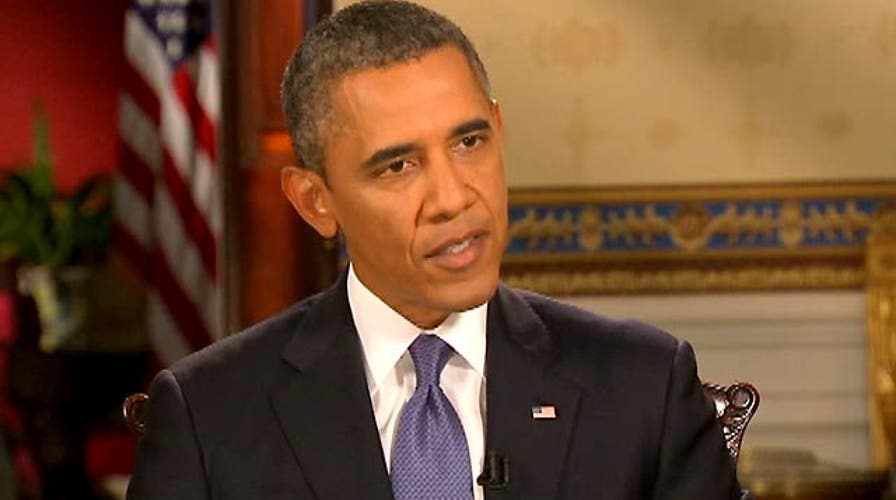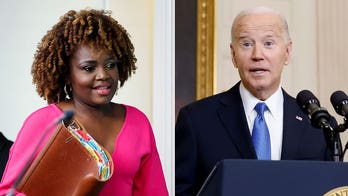Obama: We should 'explore' all diplomatic avenues in Syria
Reaction to Russian proposal to take hold of chemical weapons
President Obama probably didn’t plan it this way, but his half-dozen interviews with network anchors on Syria amounted to him pulling, in Diane Sawyer’s phrase, “back from the brink.”
What the White House designed as a television blitz to make the case for war wound up with the commander-in-chief making the case for averting war.
Which may be a matter of necessity, for as the sit-downs with ABC, NBC, CBS, Fox, CNN and PBS yesterday made clear, the president doesn’t have the media on his side on this one, not to mention Congress and the public.
Sawyer, Savannah Guthrie, Scott Pelley, Chris Wallace, Wolf Blitzer and Gwen Ifill varied in their degree of aggressive questioning, but it’s fair to describe them as skeptical.
Obama largely stuck to his talking points, invoking Ronald Reagan’s “trust but verify” more than once while making clear, in tone as well as words, that he would just as soon avoid launching cruise missiles against Syria.
A seemingly offhand comment by John Kerry hardened into a Russian proposal to have Syria surrender its chemical weapon stockpiles, and that became the focus of the television blitz ahead of tonight’s East Room address.
On Fox, when Wallace asked whether he would delay air strikes, Obama said, “There’s a reason I slowed this thing down” and that he “fervently” hoped to avoid military action.
On ABC, Sawyer asked: “Is a military strike on pause?”
“Absolutely,” Obama said—if the diplomatic deal pans out. And making clear that was not just lip service, he added “that is overwhelmingly my preference.”
Was the Russian proposal, NBC’s Guthrie asked, a “stalling tactic?” No, it was “a potentially positive development," Obama said.
Is Obama confident he can win military authorization from Congress? “I wouldn’t say I’m confident,” he told Guthrie in the day’s most candid response.
“How much responsibility do you think you bear for the opposition?” Wallace asked. The president basically restated his position.
Pelley and Ifill asked the shortest and most straightforward questions. But even the CBS anchor flatly declared, “The people aren’t with you.”
Every anchor asked about Bashar Assad’s threat of retaliation, and Obama uniformly said the Syrian leader didn’t have the capacity to hurt the United States.
Only a president has the ability to command this kind of megaphone at will. The point is to drive an unambiguous message.
With Obama facing make-or-break votes in the Senate and House, this was his best shot, other than the White House address, a format that loses its punch over time, at moving public opinion.
But without dropping the military threat, Obama pivoted to the Russian-paved diplomatic route.
And if the interviews are any indication, that might give him, and lawmakers who aren’t dying to vote on this, a way to neutralize the showdown.
Obama was “scooped,” in a sense, by Assad, whose interview with Charlie Rose aired Monday on "CBS This Morning", before the president sat down with the network anchors in the afternoon.
Rose handled the situation deftly, pressing the dictator politely but firmly on his use of chemical weapons without coming off as an interrogator. Assad seemed stiff and robotic, and his denials sounded hollow.
But Assad may have gotten what he wanted out of the encounter by warning darkly that the United States should “expect everything” if there are missile strikes, not necessarily from his regime, mind you, but from terrorists or other factions in the regions.
He was never going to come off as warm and cuddly, so must have concluded that wavering American lawmakers might be influenced by outright threats.
It could well have the opposite effect, but apparently that was the only card he had to play.
For Obama, the decision to offer up seven-minute sessions to the six networks was more than an effort to pop up on every channel. (ESPN must have been booked solid.)
The White House knew that every network would heavily promote its interview with its star anchor, regardless of how many he did.
Miley Trumps Assad
We may be in the midst of a world crisis with Syria, but that hasn’t stopped Americans from ogling Miley Cyrus.
Don’t take my word for it because I’ve got the hard numbers.
As New York magazine reports, “Americans viewed twelve times as many pages about Miley Cyrus as they did about Syria — even though the news sources published 2.4 Syria articles for every one about Miley.”
This is kinda depressing.
So in the three days after Cyrus’s sexually suggesting performance at the VMAs, when President Obama was also threatening air strikes against Syria, the Miley stories viewed on major news outlets like CNN, Fox and ESPN accounted for 12 percent of total U.S. page views.
And Syria? Just 1 percent.
I get that Cyrus was a more intriguing story, it centered on a former teenage star flaunting herself in utterly inappropriate ways, and there were pictures and video.
The Syria confrontation over chemical weapons, meanwhile, is a definite downer.
And the Miley story isn’t done. As if her twerking and grinding on MTV wasn’t enough, the 20-year-old appears naked in a new video and her tongue gets a workout.
Here’s the link, but I, for one, have had enough.





